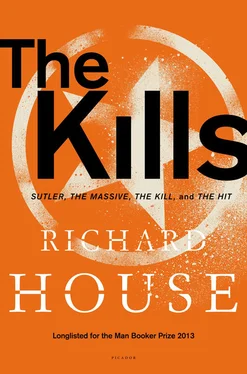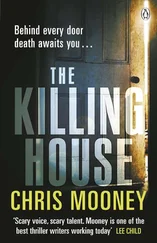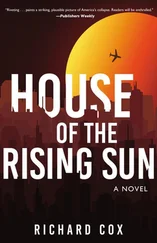3.10
Anne sat with her back to the café and gave her order in English.
See, she told herself, see how well this suits you. Relaxed, she looked to the hotel and wondered if she should call Eric. She wanted to clear her mind, to have absolutely nothing in her head so that she could approach her work without the framework of other worries or concerns. But she worried about speaking with him. She worried that he could somehow divine her thoughts, and guess that she had read his private discussions, this online banter with other men. She thought of herself as a bad spy, the world’s worst, possessing no cunning, not one ounce. Above her, blinds and shutters clattered open as the hotel rooms were cleaned, sunlight bold on the upper storeys.
The street curved toward the Campo di Fiori — a street busy with scooters. It was disappointing not to have heard from him. If Eric called the conversation would open up as something natural, easy, he would talk about his holiday and they would have a subject to discuss. If she called, it would be her prerogative to steer the discussion, and she had nothing to say — or rather, she knew that whatever she had to say would sound false and he would immediately sense her unease. Disappointed not to have heard from him she checked her mobile for new messages. She called, in any case, and left a message.
‘Eric? Eric, it’s your mother. I’m in Rome. I’ve just arrived. I’ll try you later this evening.’
Her voice, her tone, she knew, gave away her mind.
3.11
Heida caught her reflection as she came out of the bathroom, and thought to her alarm that she looked uncomfortably like Grüner’s wife.
Troubled by the likeness she returned to the mirror. It wasn’t one specific detail, more a combination of parts and effect. The colour of her hair, the fact that it appeared so unkempt, and these clothes, admittedly not her favourite (a short skirt, a striped long-sleeve top), made her look exhausted. No, it was something in her stance, some aspect locked in her body that made this comparison true. She turned sideways, and there it was. A soggy downward curve, a stroke of disappointment describing her shoulders, her breasts, her mouth, as if this curve had imposed itself on her overnight.
‘Christ.’
‘What’s the matter?’
‘Look what you’ve done to me.’
Used to not understanding her, Grüner gave a smile intended to show understanding. Heida read this dumb expression as culpable awareness. He knew exactly what he was doing to her. Men always do.
‘Don’t worry, I’m not pregnant.’
The plan was simple: having contacted the Turkish official who was to help with their visas into Iraq they were to travel, one to Ankara, and one to Istanbul, to be certain to catch the man, as he was, at best, elusive. This slippery subject, always in transit from one city to another, would be caught by one or the other.
‘We should have kept the car,’ she said, one more point against him.
Heida ran her hand over her stomach. Even when she stood upright, this curve, this gravity, imposed itself on her.
3.12
Eric came into the room as Ford was packing. His decision to leave came to him as a sudden and necessary fact — with the pension being watched he was taking too great a risk. Martin’s project placed him square in the eyes of the police, and if the police made any enquiries they would easily discover that the name he had given Mehmet, the name used by Nathalie, Martin and Eric, was different to the name in his passport. If they enquired into this small discrepancy he couldn’t be sure what else they might discover. The dog tags, for example, how would he explain those? He needed to make the transfer. He needed to get to Istanbul.
Eric stood over the cot, hands at his side, visibly stung. ‘What are you doing?’
‘It’s time to move on. I’ll take the bus to Ankara then try for the Black Sea. If I go now I might catch up with my friend.’
‘Friend?’
‘Yes.’ Ford stood upright, laundry bunched in his hand. ‘Amy.’ Amy? He wasn’t good with names. Not off the cuff.
‘Amy?’
‘The woman I was travelling with.’
‘You said she’s with someone else now?’
Bothered that he had to explain himself Ford returned to packing. ‘It’s complicated. I should make the effort.’
Eric nodded slowly, as if he didn’t follow, as if other people’s situations were always slightly out of his understanding.
Ford checked the small pocket inside his pack, and took off the dog tags and tucked them inside, because the tags, the weight of them, like everything else, was beginning to bother him.
* * *
Eric accompanied Ford into town. As they came out of the pension the man in the car looked up but didn’t move. The sun cut across a clean-shaved chin, a thin mouth, a fat moustache. He remained in the car as they turned off the street to the main road.
Ford gripped the straps of his backpack, ready to sprint if he needed to, but the car did not follow them, and Eric, preoccupied himself, did not appear to notice his anxiety. If the man approached them now at least Ford could run. At the Maison du Rève he would have been trapped.
With regular coaches to Ankara throughout the day he found he had a choice: one at midday, one at three, and the last at eleven at night; each connecting with a coach to Istanbul. Ford decided on the midday bus, why wait, only to find the service fully booked. Three o’clock? No trouble. Depart later, arrive early in the morning. He’d wait in one of the tea houses in the market square. Eric stayed with him, and they sat under canvas and faced the market.
Eric sought advice.
‘I knew what it would be like. No one will work with him.’
‘So why did you?’
‘A paid holiday. Experience. Extra credit.’ He frowned. All of this was well and good, but Martin was a fully subscribed asshole who had managed to isolate himself from his students, fellow academics, from the art establishment. Even so, inexplicably, the project was gaining attention. ‘People want to show the work. Museums. Curators. We’re going to screen the first section at the Gare du Nord in Paris. Six projections cycling through forty-seven hours of material. Six screens.’ He swept out his hands. ‘Massive.’ Each testimony prefaced with a landscape, each talking head presented in their original language, their own words. Speakers fixed to inverted plastic domes would direct the sound upon the travellers, creating zones where their voices could be heard without interfering with the station’s activity — an immense undertaking. There was talk about showing the entire cycle, all five sections, in Grenoble, at Magazin.
Eric continued talking. Ford kept his eye on the market, the stalls, and the three streets that fed into the enclosed square. Police, men in military drab ambled without intent among the traders and shoppers, a muddle of activity. He looked back into the café at the dusty red walls, at the barber shop beside it, the door to the hammam closed — everything so ordinary that he began to relax. Beside their table sat a bulky unlit stove, and the air was busy with the fats of cooking meat, of coffee, of dust. In three hours he would be on his way to Istanbul. The decision to leave felt right and wise.
‘You don’t get the opportunity to work on material like this. It just doesn’t happen.’
Ford only caught snippets: And when someone is that creative … difficult … work through it … We have history, Martin and me. Anyone on the outside wouldn’t … At some point Eric paused as if waiting for an answer, waiting for Ford to disagree or approve.
‘Do whatever you think is best.’
Читать дальше












